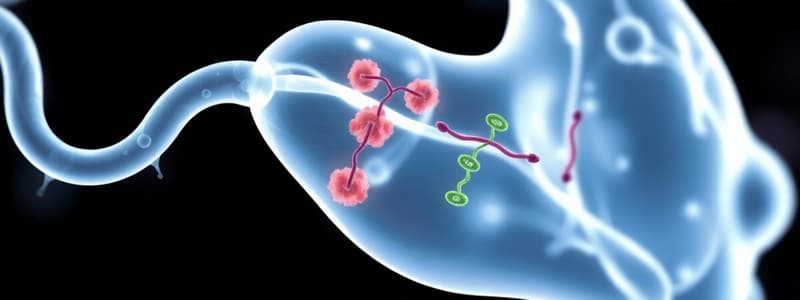Podcast
Questions and Answers
What is the primary product of the reaction catalyzed by the PDH complex when pyruvate is converted to acetyl CoA?
What is the primary product of the reaction catalyzed by the PDH complex when pyruvate is converted to acetyl CoA?
Which vitamin is associated with pantothenic acid in the structure of Coenzyme A?
Which vitamin is associated with pantothenic acid in the structure of Coenzyme A?
What effect does phosphorylation have on the activity of the PDH complex?
What effect does phosphorylation have on the activity of the PDH complex?
Which of the following is NOT one of the cofactors involved in the PDH complex?
Which of the following is NOT one of the cofactors involved in the PDH complex?
Signup and view all the answers
Chronic Lactic Acidosis can result from inherited decreased activity of which enzyme complex?
Chronic Lactic Acidosis can result from inherited decreased activity of which enzyme complex?
Signup and view all the answers
What is the primary function of the Citric Acid Cycle in cellular respiration?
What is the primary function of the Citric Acid Cycle in cellular respiration?
Signup and view all the answers
Which stage follows the conversion of acetylCoA in cellular respiration?
Which stage follows the conversion of acetylCoA in cellular respiration?
Signup and view all the answers
What is the role of pyruvate dehydrogenase complex in cellular respiration?
What is the role of pyruvate dehydrogenase complex in cellular respiration?
Signup and view all the answers
What is the main byproduct of the oxidation of acetylCoA in the Citric Acid Cycle?
What is the main byproduct of the oxidation of acetylCoA in the Citric Acid Cycle?
Signup and view all the answers
In which organelle does cellular respiration mainly take place?
In which organelle does cellular respiration mainly take place?
Signup and view all the answers
What is the ultimate electron acceptor in vivo?
What is the ultimate electron acceptor in vivo?
Signup and view all the answers
Which compounds are primarily used for energy storage in vivo?
Which compounds are primarily used for energy storage in vivo?
Signup and view all the answers
What characterizes the amphibolic nature of the citric acid cycle?
What characterizes the amphibolic nature of the citric acid cycle?
Signup and view all the answers
Which vitamin is associated with the disease Beri-Beri?
Which vitamin is associated with the disease Beri-Beri?
Signup and view all the answers
What is the fate of citrate in the citric acid cycle influenced by?
What is the fate of citrate in the citric acid cycle influenced by?
Signup and view all the answers
What is the role of thiamine pyrophosphate (TPP) in the PDH complex?
What is the role of thiamine pyrophosphate (TPP) in the PDH complex?
Signup and view all the answers
Which enzyme in the PDH complex is responsible for the decarboxylation of pyruvate?
Which enzyme in the PDH complex is responsible for the decarboxylation of pyruvate?
Signup and view all the answers
How many molecules constitute the E2 dihydrolipoyl transacetylase in the PDH complex?
How many molecules constitute the E2 dihydrolipoyl transacetylase in the PDH complex?
Signup and view all the answers
What happens to the acetaldehyde during the oxidation step of the reaction?
What happens to the acetaldehyde during the oxidation step of the reaction?
Signup and view all the answers
What type of reaction is performed by the E1 enzyme in the PDH complex?
What type of reaction is performed by the E1 enzyme in the PDH complex?
Signup and view all the answers
Which molecule acts as an electron sink during the decarboxylation of pyruvate?
Which molecule acts as an electron sink during the decarboxylation of pyruvate?
Signup and view all the answers
What is the fate of free thiamine after the reaction in the PDH complex?
What is the fate of free thiamine after the reaction in the PDH complex?
Signup and view all the answers
What role does the swinging lipoyl arm of E2 play in the PDH complex?
What role does the swinging lipoyl arm of E2 play in the PDH complex?
Signup and view all the answers
What is formed from the decarboxylation of pyruvate before oxidation occurs?
What is formed from the decarboxylation of pyruvate before oxidation occurs?
Signup and view all the answers
Which of the following statements about the PDH complex is correct?
Which of the following statements about the PDH complex is correct?
Signup and view all the answers
What is the primary function of dihydrolipoyl dehydrogenase (E3) in the citric acid cycle?
What is the primary function of dihydrolipoyl dehydrogenase (E3) in the citric acid cycle?
Signup and view all the answers
Which molecule donates the acetyl group to oxaloacetate in the citric acid cycle?
Which molecule donates the acetyl group to oxaloacetate in the citric acid cycle?
Signup and view all the answers
Which of the following statements is true regarding anaplerotic reactions?
Which of the following statements is true regarding anaplerotic reactions?
Signup and view all the answers
At which step does citrate isomerization to isocitrate occur?
At which step does citrate isomerization to isocitrate occur?
Signup and view all the answers
How many ATP equivalents are produced from one FADH2 molecule through the citric acid cycle?
How many ATP equivalents are produced from one FADH2 molecule through the citric acid cycle?
Signup and view all the answers
Which reaction involves the conversion of isocitrate to α-ketoglutarate?
Which reaction involves the conversion of isocitrate to α-ketoglutarate?
Signup and view all the answers
What is the end product when malate is oxidized in the citric acid cycle?
What is the end product when malate is oxidized in the citric acid cycle?
Signup and view all the answers
What is the role of succinyl-CoA in the cycle?
What is the role of succinyl-CoA in the cycle?
Signup and view all the answers
Which of the following is NOT a component of the overall reaction for the citric acid cycle?
Which of the following is NOT a component of the overall reaction for the citric acid cycle?
Signup and view all the answers
What is produced alongside NADH during the oxidative decarboxylation of α-ketoglutarate?
What is produced alongside NADH during the oxidative decarboxylation of α-ketoglutarate?
Signup and view all the answers
In cellular respiration, what metabolic pathway is often referred to as amphibolic?
In cellular respiration, what metabolic pathway is often referred to as amphibolic?
Signup and view all the answers
What is the source of the carbon atoms ultimately incorporated into glucose from pyruvate metabolism?
What is the source of the carbon atoms ultimately incorporated into glucose from pyruvate metabolism?
Signup and view all the answers
Which metabolic event is the first step in the citric acid cycle?
Which metabolic event is the first step in the citric acid cycle?
Signup and view all the answers
Study Notes
Citric Acid Cycle
- The citric acid cycle (also known as the Krebs cycle or TCA cycle) is a crucial metabolic pathway in cellular respiration.
- It's an aerobic process, meaning it requires oxygen.
- The cycle's primary function is to oxidize acetyl-CoA derived from carbohydrates, fats, or proteins, producing energy in the form of ATP.
- The cycle involves a series of enzymatic reactions that transform acetyl-CoA to carbon dioxide (CO2) and reduces electron carrier molecules (NADH and FADH2).
Stages of Cellular Respiration
- Cellular respiration comprises three stages:
- Oxidation of organic fuels to acetyl-CoA.
- Conversion of acetyl-CoA to CO2 and reduced electron carriers (NADH, FADH2).
- Oxidation of electron carriers with oxygen, producing ATP via oxidative phosphorylation.
Cellular Respiration Location & Components
- Cellular respiration takes place in the mitochondria.
- Mitochondria comprise an outer and inner membrane, cristae, and a matrix.
- The inner membrane houses electron transport chain components such as respiratory complexes I-IV and ATP synthase.
- The matrix contains enzymes for the citric acid cycle and fatty acid oxidation.
Oxidation of Pyruvate to Acetyl-CoA
- This step is catalyzed by the pyruvate dehydrogenase complex (PDH).
- PDH converts pyruvate (a 3-carbon molecule) to acetyl-CoA (a 2-carbon molecule), releasing CO2.
- The process involves 3 enzymes (E1, E2, and E3) and 5 cofactors (TPP, lipoic acid, NAD+, FAD, and coenzyme A).
- PDH is an irreversible reaction.
Coenzyme A & Acetyl-CoA Structure and Function
- Coenzyme A is a crucial molecule for carrying acetyl groups.
- A key component of coenzyme A is pantothenic acid (Vitamin B5).
- Acetyl-CoA carries acetyl groups to the citric acid cycle.
Lipoic Acid Function
- Lipoic acid acts as a cofactor in the PDH complex and the citric acid cycle.
- It facilitates redox reactions and assists in carrying acetyl groups.
Citric Acid Cycle - Intermediate Steps
- Seven enzymatic reactions comprise the citric acid cycle.
- Each reaction transforms a specific intermediate to another.
- Key intermediates, including citrate, isocitrate, a-ketoglutarate, succinate, fumarate, malate, and oxaloacetate, are critical in the cycle.
Citric Acid Cycle - Energy Production
- The cycle generates ATP through substrate-level phosphorylation (succinyl-CoA to succinate).
- More significantly, oxidation of NADH and FADH2 produces a large amount of ATP via oxidative phosphorylation.
Anaplerotic Reactions
- Anaplerotic reactions replenish citric acid cycle intermediates consumed during biosynthetic pathways.
Fate of Citrate and Other Intermediates
- Citrate is exported to the cytoplasm, where it plays roles in fatty acid and cholesterol biosynthesis.
- Other intermediates, like succinate, are used in porphyrin synthesis, heme production, and ketone body utilization.
Regulation of TCA Cycle
- The TCA cycle is regulated by the activity of key enzymes.
- Important regulatory molecules include ATP, ADP, NADH, and Ca2+.
- Other regulatory metabolites, such as citrate and isocitrate, also participate in feedback mechanisms.
Biological Tethers
- Certain molecules facilitate the transfer of carbon-containing compounds between different enzymes in the cellular pathways.
- Examples include lipoic acid, biotin, and coenzyme A, which aid in carrying groups and electrons.
TCA Cycle Summary
- The citric acid cycle is a central metabolic pathway converting acetyl-CoA to carbon dioxide, generating NADH and FADH2 for ATP production in oxidative phosphorylation. Citric acid cycle intermediates are used in various biosynthetic processes, such as amino acid production and porphyrin synthesis. Its regulation is crucial to cellular energy balance.
Drugs and Diseases
- Deficiencies in vitamins (e.g., thiamine, riboflavin, niacin, pantothenic acid) involved in citric acid cycle enzymes cause diseases.
- Examples include Beri-Beri, ariboflavinosis, pellagra, and chronic lactic acidosis (CLA).
Studying That Suits You
Use AI to generate personalized quizzes and flashcards to suit your learning preferences.
Related Documents
Description
Test your knowledge on the citric acid cycle and the overall process of cellular respiration. This quiz covers the stages, locations, and components involved, including the conversion of acetyl-CoA and ATP production. Prepare to explore the metabolic pathways that are essential for energy production in cells.




